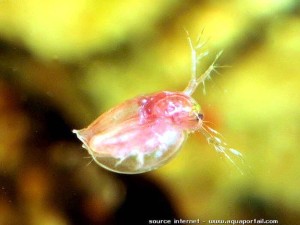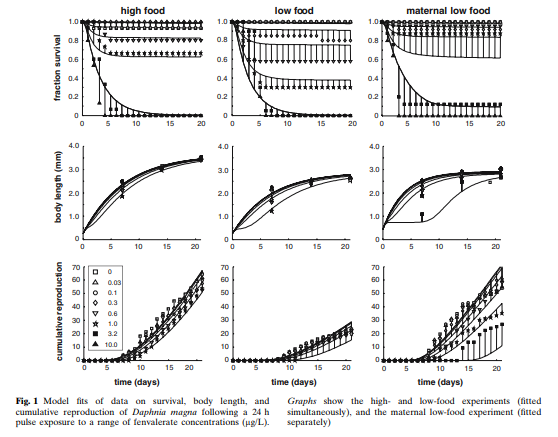Are pesticides more dangerous when you are hungry?by Angèle Lorient
Published by the January 6, 2020 on 1:52 PM
Today, the impact of pesticides on our environment is a central issue in many publications and a major concern for all citizens. Between 2014 and 2016 the use of pesticides increased by 12%. Indeed, intensive farming currently used implies that we find in our food, in the air but also in water, traces of pesticides. A 2013 Inserm report highlights a link between exposure to pesticides and the appearance of cancer or pathology such as Parkinson's disease but also developmental problems on children. Therefore, they harm the health of humans but also the entire terrestrial and aquatic ecosystems.

Water Flea Daphnia Magna. www.aquaportail.com
In addition to using a large amount of chemicals, modern farming methods make soils less permeable. As a result, precipitation runoff is a major contributor to pesticide pollution from our streams. In order to study the toxicity of pesticides in the aquatic environment, the majority of laboratories use Daphnia as an indicator of water quality, and in particular the species Daphnia magna for their sensitivity to toxins.
Daphnies are small crustaceans measuring about 1 to 4 millimeters. They live mainly in fresh water (river, pond, lakes). They are filter feeders that help maintain the clarity of the water thanks to their ability to eat green algae. During a day they move between the bottom and the surface of the water depending on the light (photoperiod).
In 2006 a study was conducted by 4 scientists (2) to study the physiological responses (sensitivity, growth, reproduction) of daphnies to different dietary concentrations of the same pesticide to which they and their mothers were subjected. (high food or low food).
The study shows that lack of food does not play a direct role in the sensitivity of daphnies to the pesticide in question. However, it is one of the factors determining the level of absorption and elimination of this toxic substance by the body. In addition, the energy used to fight this toxin has a negative effect on the maintenance of vital functions.
In a period of low availability of food resources, invertebrates will have a more limited growth and a lower reproductive rate in proportion to the level of pesticide present in their environment. While the impact is less when they are subject to sufficient food resources (Fig 1).

For the different types of food resource, the effect of the pesticide concentration is proportional to the survival rate. On the other hand, we can notice that there is a threshold effect concerning growth and reproduction.
However, they also highlighted that these individuals, when no longer subject to the pesticide, found a normal activity (resilience).
This study makes it possible to highlight the potential impacts on the results of the experiments if certain non-standardized conditions vary between laboratories (concentration of food, respect of the photoperiod). As well as the differences in test organism responses between conventional environmental conditions (controlled artificial environment) and the natural environment (subject to variations).
The analysis of the results of this study raises the following questions:
- What is happening in the longer term?
- Does the repeated presence of pesticide pulses have the same physiological effects on an individual throughout his life?
- Is the speed of resilience due to the species or can it vary individually?
- Is there resiliency of newborns from underfed mothers?
It also shows the urgency of taking into account the impacts of pesticides, both on our current health, on the heritage that we will transmit, but also on our ability to reproduce. Despite the mobilization of the Ministry of Agriculture including the program "Ambition bio 2017" there is urgency. Pesticides are one of the main causes of pollution in our waterways. This pollution endangers aquatic life, as has been demonstrated, but also the drinking water resource. Should not our entire consumption system be called into question in order to be able to realistically implement the planned management plans?

This post is licensed under a Creative Commons Attribution-ShareAlike 4.0 International License.





